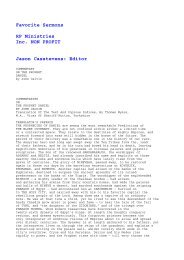Lamentations - The Sermon Depository
Lamentations - The Sermon Depository
Lamentations - The Sermon Depository
You also want an ePaper? Increase the reach of your titles
YUMPU automatically turns print PDFs into web optimized ePapers that Google loves.
me: sacerdotes mei et seniores mei in urbe<br />
obierunt, quia quaesierint cibum sibi et<br />
refocillarunt (ad verbum, hoc est, ut<br />
refocillarent) animam suam (ad verbum, ut<br />
redire facerent, quemadmodum Gallice<br />
dicimus, faire revenir le coeur.)<br />
Here the people of God complain in the person of a woman, as we have<br />
before seen, that in their calamity they were left destitute of every<br />
comfort. And it is a circumstance which increases grief, when no one is<br />
present to shew any kindness to the miserable; for it is no small alleviation<br />
of sorrow, when friends offer their kind services, and as far as they can,<br />
endeavor to mitigate the severity of the evil.<br />
<strong>The</strong> Church of God now says, that she was so forsaken by friends as to be<br />
left alone to pine away in her mourning and sorrow. <strong>The</strong>re may, however,<br />
be here an allusion to shameful and impure connections; for by this term,<br />
friends, the Spirit often points out the Egyptians as well as others in<br />
whom the Israelites had foolishly trusted; for in this manner, we know,<br />
they had turned aside from conjugal fidelity. God had bound them to<br />
himself, that they might acquiesce in his favor alone; and so to acquiesce<br />
was their spiritual chastity. Rightly, then, does Scripture compare both the<br />
Egyptians and the Assyrians to harlots, whenever the Israelites sought aid<br />
from them. But as this explanation seems too refined, I am content to view<br />
what is said simply as a complaint., that the people of God, though<br />
looking in all directions, yet could find no comfort in the world. I cried, she<br />
said, to my friends; they deceived me.<br />
It is then added, My priests and mine elders expired in the city. Had they<br />
been slain in battle, it would have been no wonder; for they who go against<br />
an enemy, go as it were to meet death. But God’s people here deplore a<br />
more grievous evil, that the priests died in the city, not through the<br />
enemies’ sword, but through famine, which is as it were the extreme of<br />
evils. It is then said, that the priests as well as the elders perished through<br />
famine, because they could not find food. And when it is said that they<br />
sought food to refresh the soul, there is a contrast to be understood<br />
between ordinary food and a remedy for the famine; for we naturally seek<br />
food whenever we feel hungry; but the Prophet refers here to something<br />
more than this, even that the priests and the elders sought food, because<br />
long abstinence urged them; and it was very sad, that the priests, who<br />
excelled in honor, and also the elders, were thus reduced to want. Had such<br />
a thing happened to the common people, it would not have been so<br />
wonderful; for the long siege of the city had consumed all their provisions.<br />
But when the priests, and those who had wealth, were thus oppressed<br />
with hunger, we may conclude that the want which the Prophet wished to<br />
describe was extreme. It follows, —<br />
<strong>Lamentations</strong> 1:20<br />
20. Behold, O Lord, for I am in<br />
distress; my bowels are troubled:<br />
mine heart is turned within me;<br />
for I have greviously rebelled:<br />
abroad the sword bereaveth, at<br />
home there is as death.<br />
20. Vide Jehova, quia afflictio mihi,<br />
(vel, augustia,) viscera mea<br />
conturbata sunt (alii, contracta;)<br />
eversum est cor meum interme,<br />
quia rebellando rebellavi; fris orbat<br />
gladius, domi tanquam mors.<br />
<strong>The</strong> people turn again to pray God: and what has been before said ought to<br />
be remembered, that these lamentations of Jeremiah differ from the<br />
complaints of the ungodly; because the faithful first acknowledge that they<br />
are justly chastised by God’s hand, and secondly, they trust in his mercy<br />
and implore his aid. For by these two marks the Church is distinguished<br />
from the unbelieving, even by repentance and faith. To sigh and to mourn<br />
in adversities, and to lament also their miseries, are common to both; but



